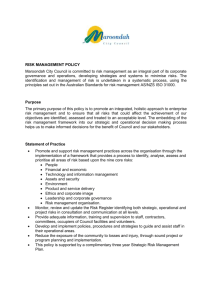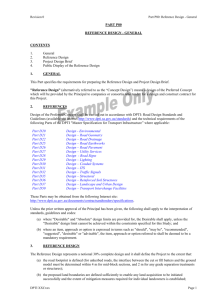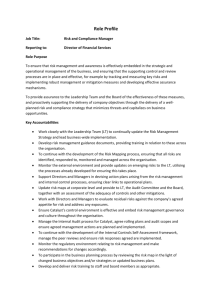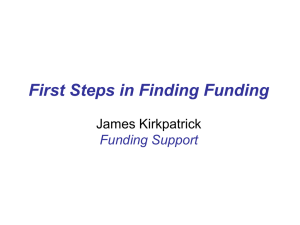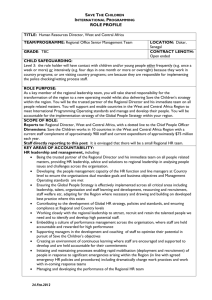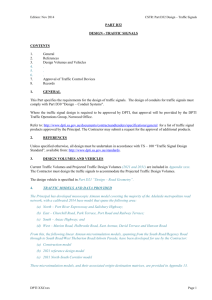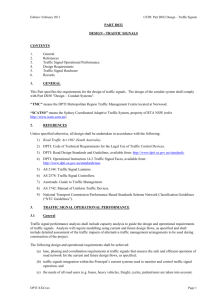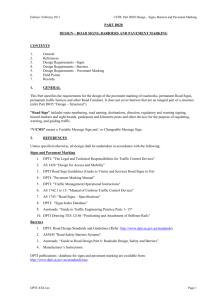Project Roles - Department of Planning, Transport and Infrastructure
advertisement
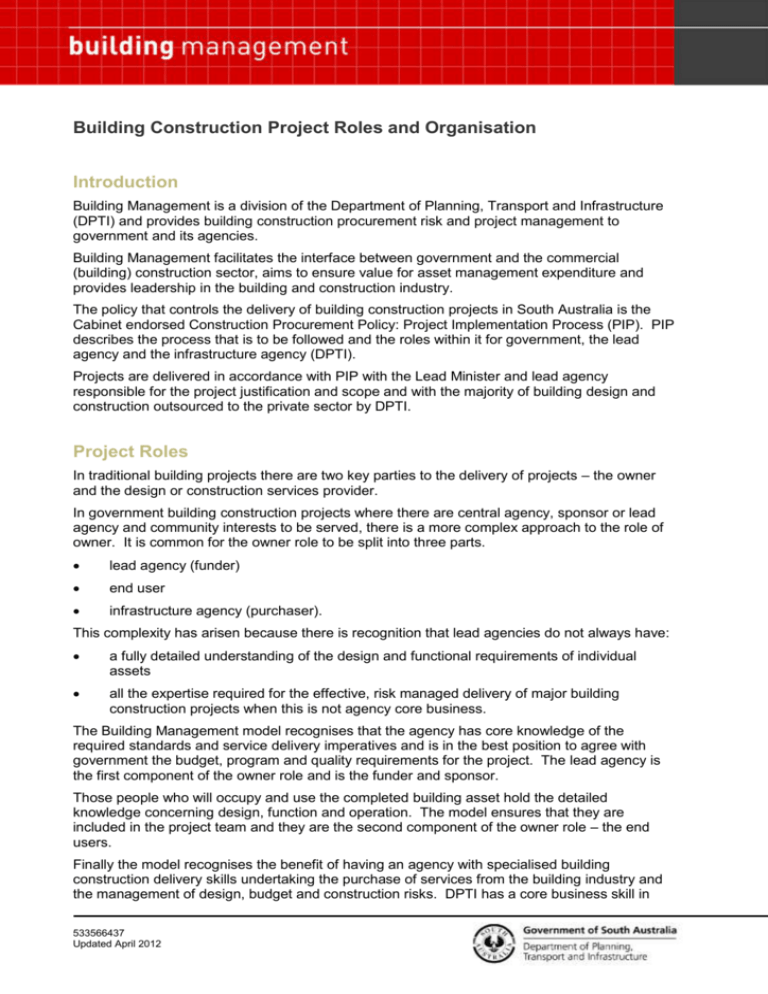
Building Construction Project Roles and Organisation Introduction Building Management is a division of the Department of Planning, Transport and Infrastructure (DPTI) and provides building construction procurement risk and project management to government and its agencies. Building Management facilitates the interface between government and the commercial (building) construction sector, aims to ensure value for asset management expenditure and provides leadership in the building and construction industry. The policy that controls the delivery of building construction projects in South Australia is the Cabinet endorsed Construction Procurement Policy: Project Implementation Process (PIP). PIP describes the process that is to be followed and the roles within it for government, the lead agency and the infrastructure agency (DPTI). Projects are delivered in accordance with PIP with the Lead Minister and lead agency responsible for the project justification and scope and with the majority of building design and construction outsourced to the private sector by DPTI. Project Roles In traditional building projects there are two key parties to the delivery of projects – the owner and the design or construction services provider. In government building construction projects where there are central agency, sponsor or lead agency and community interests to be served, there is a more complex approach to the role of owner. It is common for the owner role to be split into three parts. lead agency (funder) end user infrastructure agency (purchaser). This complexity has arisen because there is recognition that lead agencies do not always have: a fully detailed understanding of the design and functional requirements of individual assets all the expertise required for the effective, risk managed delivery of major building construction projects when this is not agency core business. The Building Management model recognises that the agency has core knowledge of the required standards and service delivery imperatives and is in the best position to agree with government the budget, program and quality requirements for the project. The lead agency is the first component of the owner role and is the funder and sponsor. Those people who will occupy and use the completed building asset hold the detailed knowledge concerning design, function and operation. The model ensures that they are included in the project team and they are the second component of the owner role – the end users. Finally the model recognises the benefit of having an agency with specialised building construction delivery skills undertaking the purchase of services from the building industry and the management of design, budget and construction risks. DPTI has a core business skill in 533566437 Updated April 2012 Building Construction Project Roles and Organisation this area and provides the third component of the owner role and is the infrastructure agency and purchaser. Most design related and all construction services are outsourced to private sector contractors in the building construction industry. These professional service and construction contractors have a key delivery role as service providers. A very important relationship in building construction delivery is the one between the provider team and the end user team. It is the strength of this relationship that governs the success of the detailed design and function of the building asset. Also critical to success, is the provision of an integrated project management framework by the lead agency and infrastructure agency working together in support of the project team. The three owner roles and the providers’ role are discussed in greater detail below. Lead Agency (Funder) Provides the funding for the project and is the ‘owner’, ‘client’ or ‘lead agency’. In building construction projects, the Lead Minister and relevant lead agency responsible for the project deliver the role. The Funder is responsible throughout the life of the project for: determining, justifying and managing the scope of the project based on service delivery need and client strategic directions funding the project and determining the budget and the key priorities within the budget ensuring that the End User and community needs are met ensuring an effective project management process ensuring via project committees that the delivery of the project is within the approved scope, quality, time and cost through accountable management practice including: - clear definition of project objectives and brief - business case support - rigorous option evaluation and scope prioritisation - effective resourcing - comprehensive risk management - comprehensive review, reporting and records management processes - quality assurance mechanisms - financial and quality audit ensuring that the project satisfies all requirements of sound prudential management submitting proposals through all government approval stages ensuring the Capital Investment Program funding provisions are efficiently utilised in both the project and across the Program. End User Uses the new or redeveloped asset and in government projects is the customer of the Agency – school councils, health units, police stations, boards, other community service providers and the like. The End User is responsible for managing that: the brief of requirements is comprehensive user and community stakeholder input to the concept planning, design and documentation Page 2 of 5 Building Construction Project Roles and Organisation achieves agreement to the design solution ensuring there is appropriate consultation with user representatives the Provider is fully briefed on the operational and functional needs and priorities the brief is agreed with the Funder and adhered to after sign off there is facilitation of the project during construction and commissioning. Infrastructure Agency (Purchaser) Purchases services from the service providers and is an expert partner to the Lead Agency based on a core business expertise in building industry procurement and project risk management. In building construction projects over $150,000 in value, the Minister for Transport and Infrastructure and DPTI perform the role of infrastructure agency. DPTI is responsible to the lead agency for: provision of management frameworks which manage risks in scope, program, budget, procurement, design, construction, human resources, organisation, communication and reporting provision of consistent contractual frameworks resolution of disputes between the lead agency and the providers. Providers Provide professional service and construction contractor services to the lead agency and end users. Private sector building professionals or contractors are the service providers generally. In some instances Building Management is the provider in order to support its expertise as an infrastructure agency. The providers are responsible to the lead agency for the effective management, design and construction of the project in accordance with the project objectives for time, cost and quality and to the infrastructure agency for the fulfilment of contractual obligations. Role of Building Management in Building Construction Projects The role, which Building Management plays on projects through Project Services, is consistent for all agencies and projects. When a lead agency undertakes a construction project over $150,000 in value, Building Management provides the infrastructure agency role. The role has been developed to target the key risks to government in the procurement of new and refurbished assets. The services provided by Building Management empower the private sector providers of design and construction services to work effectively with the lead agency and its end users in an environment where the risks are effectively managed. The Building Management services address five key risk areas that have been identified in the delivery of major building construction projects. The key risk areas are: project management budget design (including heritage) construction Page 3 of 5 Building Construction Project Roles and Organisation procurement (tenders and contracts). Key risk management roles for Building Management are: implementing and managing project governance and management frameworks advising on required building industry resources determining and implementing appropriate procurement processes and managing tendering/contract processes for professional service and construction contractor engagements providing budget review, design review and construction audit risk management services development and management of project program, cost plans and quality plans assisting in obtaining approvals implementing a risk management framework. Building Management services are provided on a fee-for-service basis with costs being met from the project budget. Costs are benchmarked against the private sector and are determined by a sliding scale dependant on project value. Service provision costs generally range between 1% and 5% of the project value. Project Management and Organisation The Lead Minister and lead agency are accountable for the delivery of the project. The Minister for Transport and Infrastructure and Building Management are accountable for contracting out the management, design and construction services and for overall management of project risk. PIP, relevant Treasury Instructions and government policy govern the DPTI project management framework. Within the framework the lead agency and DPTI agree: personnel to be appointed committees to be established to manage the project responsible personnel from the parties project organisation structure. Typically three key teams are established to manage the project. Project Steering Committee (Executive Leadership Team) The lead agency ensures a Steering Committee is established for the project. Representatives who have the authority to make strategic, policy, scope and procurement decisions, meet regularly and take action in accordance with the following terms of reference: overview the project ensuring that it is effectively managed and meets accountability and prudential management requirements endorse all major professional service contractor and contractor appointments ensure that prescribed processes are followed and approvals achieved review and approve recommendations, reports and procurement proposals from the Project Control Group comment on and endorse major project documents advise and formally report to Chief Executives, Ministers and Cabinet on issues relevant Page 4 of 5 Building Construction Project Roles and Organisation to the effective delivery of the project. Project Control Group (Integrated Management Team) Representatives of the Funder, End User, Purchaser and key Providers who have the authority to make day-to-day project decisions, meet regularly and take action with the following terms of reference: establish the roles and responsibilities of all Project Control Group members report to the Project Steering Committee be accountable for the effective day-to-day management of the project manage delivery to the agreed brief, budget and program assess the project risks and formulate strategies to manage them monitor the project to ensure appropriate resources are provided provide ongoing comprehensive professional, contractual, financial, technical and risk management of the project through regular meetings. Design and Construction Team Representatives of the key Providers with authority to make day-to-day design and construction decisions meet regularly and take action in accordance with the following terms of reference: manage project delivery to the agreed brief and specification assess the project design and construction risks and formulate strategies and plans to manage them provide ongoing comprehensive professional and technical management of the project through regular review meetings establish the roles and responsibilities of all design and construction team members monitor the project to ensure appropriate design and construction resources are provided to the project report and make recommendations to the Project Control Group to ensure effective delivery of the project. Contact For more information contact: John Domino Director Project Services Phone: 8226 5169 Email: john.domino@sa.gov.au Page 5 of 5
